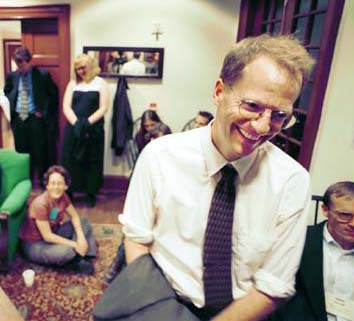Poets reflect through modernist mirror
The Daily Pennsylvanian
October 18, 2000
When Ron Silliman first read "Desert Music" by William Carlos Williams, he said: "Even though I'd never written a poem, I knew I must be a poet."
Lyn Hejinian, a poet and essayist from California, traces her modernist connection through Gertrude Stein; Rachel Blau DuPlessis sees herself through Virginia Woolf. And the six other contemporary poets who read their work at Kelly Writers House last weekend each had their own words to say about influential modernist writers as well.
The three-part program, spanning Thursday night to Saturday night, was entitled "nine contemporary poets read themselves through modernism" and brought together some of the most highly regarded, widely published poets in the English language today.
As part of the Modernist Studies Association's second annual conference, which Penn hosted this year, the event drew more than 100 poets, scholars, critics and students every night.
Modernism -- an artistic period that started around the beginning of the 20th century and includes poets like T.S. Eliot and Ezra Pounds -- is often thought to have ended with the advent of another period, "post-modernism."
Yet, according to Penn English Professor Bob Perelman, one of the nine poets featured, "There's something still very alive about modernism."
Erica Hunt, an African-American poet who talked about Samuel Beckett and James Baldwin, seemed to agree with this assessment.
"We have a problem with novelty," Hunt said. "We are bound to repeat the new."
And prominent poetry critic Marjorie Perloff quipped, "The Modernist Studies Conference could move into the present by having this reading."
The readings varied drastically in approach and style, revealing the scope of modernism itself. Joan Retallack read a passage from modern philosopher Ludwig Wittgenstein, comparing his factual prose to the "passionate method" of modernist poetry.
Meanwhile, Charles Bernstein -- whose modernist counterpart is Walter Benjamin -- read a poem that was a series of anagrams of Benjamin's name and a poem about "the two-headed figure of Karl Marx and Groucho Marx."
The poets were greeted with applause and delight.
Most everyone laughed when Silliman, the author of 24 books of poetry, explained that he was born exactly six weeks after the death of Gertrude Stein -- "in case you want to know exactly how long it takes for souls to migrate."
Each of the readings was followed by a reception, allowing conference participants to mingle until midnight.
"It's really an honor for us to be hosting these people," Writers House Director Kerry Sherin said.
English Professor Al Filreis, the faculty director of Writers House, announced that all nine presentations would be available online at www.writing.upenn.edu, where they can be accessed for pedagogical purposes at Penn and elsewhere.

